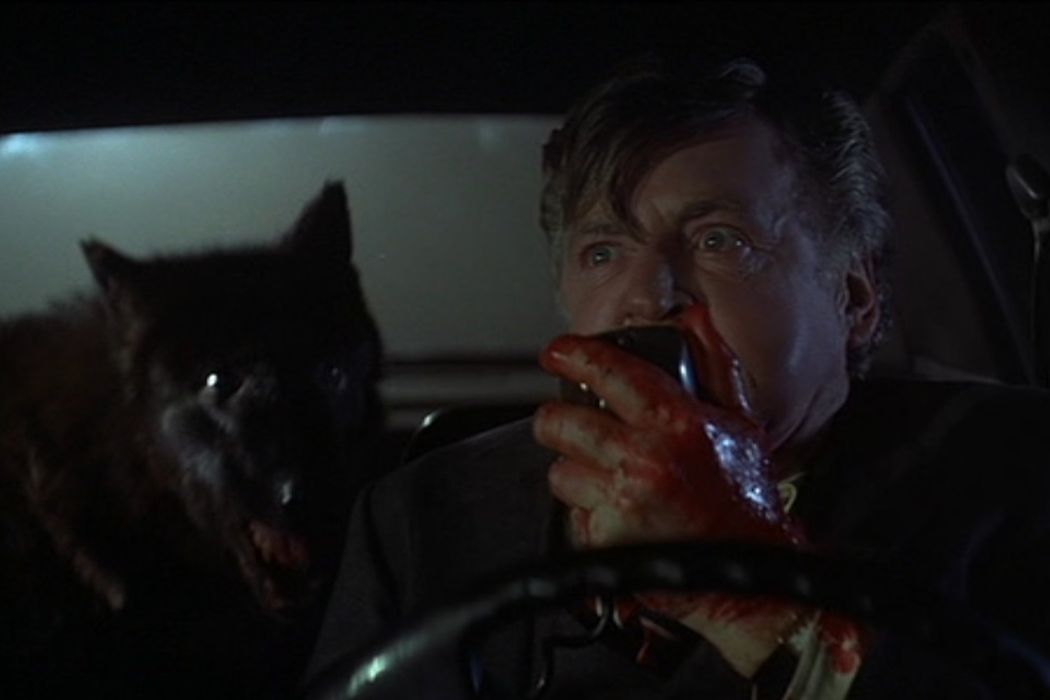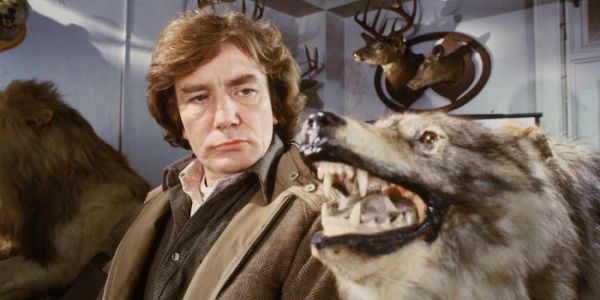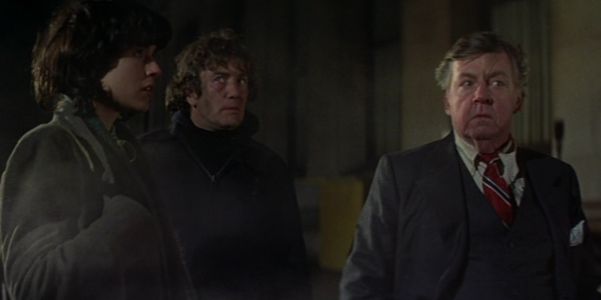WOLFEN: Horror, Capitalism & The Environment

Danny Anderson teaches English at Mount Aloysius College in PA.…
We’re in a kind of golden age of radical horror films. In politics, Bernie Sanders’ rises in the polls and class consciousness simultaneously permeates many recent horror films. Jordan Peele‘s Us and Get Out, Bong Joon Ho‘s Best Picture-Winning Parasite, and a host of others have taken up the class-based critiques of earlier classics dating back to The Texas Chainsaw Massacre and before.
One film in this tradition that has been too often overlooked is 1981’s Wolfen, directed by Michael Wadleigh and starring the great Albert Finney. Perhaps lost in the shuffle of 1981’s great werewolf revival, the film has not received the same attention as An American Werewolf in London and The Howling. Yet, it is perhaps more artistically ambitious than either of its brethren. Its innovative use of in-camera special effects and its mystical plot results in a profoundly philosophical film that is worth considering today.
The film follows a rather unorthodox New York City detective who investigates a series of brutal murders that seemed aimed at disrupting real estate development in the city. The investigation leads him to a group of Native Americans that eventually introduce him to a mystical world of ancient wolves who are lashing back at the modern world’s exploitation of nature.
Plot Summary
Wolfen opens with the brutal murders of a wealthy and powerful couple and their bodyguard just after a ground-breaking ceremony for a development in the South Bronx.
Brilliant, yet lovably off-beat detective Dewey Wilson (Finney) is brought back from mental health leave to investigate the high-profile, politically charged case. Wilson is teamed up with psychological profiler Rebecca Neff (Diane Venora), who contracts with a high-tech private security firm, the Orwellian-named “Executive Surveillance Systems,” which specializes in protecting wealthy executives from terroristic threats.

The nature of the crime initially pushes suspicion upon a form AIM (American Indian Movement) activist, Eddie Holt (Edward James Olmos) but as the case unfolds, the rationalist, Western detective discovers that a mystical race of Native American Elders, wolf-like gods called the Wolfen, is behind the murders and are motivated by simply protecting their hunting grounds from another era of White colonialism.
Though the film definitely employs and over-relies on the outdated trope of the “magical person of color,” its plot and politics offer a fascinating critique of post-1970s economic policy and the movie predicts the current crisis in capitalism’s exploitation of people and the natural environment.
Between the 70s and the 80s: High Finance’s Economic Ambitions against The Wolfen
The other two great werewolf movies of 1981, An American Werewolf in London and The Howling, use newly developed practical makeup effects to emphasize “body horror,” and though they probably work better as horror films, their political critique is limited (though The Howling is certainly an interesting investigation of pop psychology and mass media, and American Werewolf has something interesting to say about anti-Semitism and American identity).
Wolfen, conversely, takes full advantage of its political moment. Released in 1981, right at the cusp of the transition from the economic crises of the 1970s into the solutions brought forth by Ronald Reagan and his religious belief in Supply-Side Economics (popularly known as “trickle-down economics”), the film skewers the economic logic that will come to dominate the 1980s.
The movie’s opening image is fitting: the camera opens on the towering dual-figures of the World Trade Center, then slowly pans across the New York skyline, eventually pointing uptown, as if to mirror the financial industry’s sights being set on the Bronx.
The Bronx as seen in the opening moments of the film is a desolate wasteland of abject poverty and barren husks of abandoned buildings. Right in step with Reaganomics, New York’s solution is one of razing the old to make room for the new, powered by high finance and the city’s social and economic elite. The groundbreaking ceremony represents a colonial exploitation of indigenous land (as we will find out later in the film).

We hear a distant countdown and watch as an abandoned building collapses under controlled detonation. As the building falls, what is left in the background is a dilapidated, seemingly vacant church. The film then cuts to inside the church and switches to its “wolf vision” camera effect, making it clear that this former Christian house of worship is now the sanctuary of the Wolfen. We then, through their gaze, see men in suits and glimmering, ceremonial work hats breaking ground in the ruins they have just created.
These Wolfen, the apex predators of the pre-Columbian world are the one force standing in the way of High Finance’s exploitive ambition. Go back to that opening shot one more time; the pan across the city to uptown and the Bronx includes the Brooklyn Bridge. The camera zooms in to the top of the western tower to find two American Indians communing with nature in the midst of the urban landscape. This opening shot represents the role of the Wolfen in standing between American capitalism and its exploitation of the land.
What Are The Wolfen?
As we learn more about the Wolfen through Dewey’s investigation, a pattern about their victims emerges.
The first discovered victims are Christopher and Pauline van der Veer and their bodyguard. They clearly represent the power that threatens the urban wilderness of the Bronx, but the other victims are puzzling. The remains of homeless and destitute people are discovered in the rubble of a construction site, and several investigators in the case are also targeted and killed.
Near the end of the film, after his friend Whittingon (Gregory Hines) is killed on a stakeout, Dewey, at the end of his rope, desperately wanders into an Indian bar, finally open to the mystical answers they provide. They tell him the truth at last:
The Wolfen are ancient and immortal spirits from a time when human beings coexisted in harmonic balance with nature (”the Skins and the Wolves” as Eddie Holt explains it). After Europeans invaded and destroyed this natural balance, Eddie tells Dewey “The smartest ones. They went underground. Into the new wilderness. Your cities. Into the great slum areas, the graveyard of your f*ckin’ species.”
In this new wilderness, the Wolfen again worked to balance the new natural order. They preyed on the discarded and outcast and sick, the people that capitalism uses up and discards. For the Wolfen, this is the new “meat animal,” and they serve as Western Civilization’s scavengers.

When Dewey objects to the Wolfen’s brutal practices, he is told by an Indian elder, that they only kill the sick or those who threaten their lands, including the rich exploiters and the investigators who seek the truth. We are the savages, not them. They only work to return our world back to balanced, finished perfection.
Here, Dewey’s offbeat personality prepares him for this startling truth. To the other cops, he is somewhat “touched;” he seems barely sane. This quality which isolates him in his own professional, modern world, also makes him open to the magical possibilities of the Indians’ story, leading to the story’s resolution.
The Ecological Terrorism of Capitalism
Wolfen conceives of the modern world as a corruption of natural perfection and the Wolf-gods are now lashing out at it, punishing those who are again disturbing nature’s balance. As the film opens, the systems of finance and criminal justice conceive of these killings as political terrorism, a cruel perversion of the “normal” world.
The film turns this conception on its head, however. It is our modern idea of progress and profit-making that perverts the balance of nature. Capital’s endless exploitation of people and resources in the dawning era of Reaganomic expansion is explicitly linked to the genocide of Native Americans at the hands of European invaders in this film.
The film’s climax acts as a symbolic return to the natural order. Having discovered the secret of the Wolfen, Dewey and Rebecca are holed up in the penthouse suite of the van der Veer’s. In the middle of the lavish wealth and decor, sits an immense scale-model of the development project, van der Veer was working on. In other words, at the physical center of his wealth is his ambition for more wealth.
As the Wolfen descend upon them in all their ferocious power, Dewey realizes that his gun is less than useless; it is, in fact, what draws their aggression. The Wolfen are not killing for revenge, but out of defense. As this fact dawns on him, Dewey lowers his gun and instead lashes out in rage at van der Veer’s model development.
In dramatic slow-motion, he destroys the plans for the project, reducing the scale model to dust and rubble, and the wolves are satisfied, peacefully vanishing back into the shadows of the city. The threat of profit-driven development has been, for now, averted and a semblance of the natural order has been restored.
Conclusion: A Real Estate Developer as President
Watching Wolfen in 2020 is like opening a time capsule full of predictions that have all come true.
As we helplessly flail about, climate change and wildfires and economic inequality tear the planet and our institutions apart. When did we begin down this path? Was there a moment in 1981 when we might have veered to the left or right and avoided our looming catastrophe?
Many great horror films are currently investigating the madness of the systems we govern ourselves with. Wolfen belongs in that tradition, though it is also somewhat depressing. Watching it nearly 40 years after its release, one is hit in the face with the brutal irony that not only did we reject Wolfen’s warnings, we actually elected a van der Veer president and now some in the opposition party seek to run another one against him.
Does content like this matter to you?
Become a Member and support film journalism. Unlock access to all of Film Inquiry`s great articles. Join a community of like-minded readers who are passionate about cinema - get access to our private members Network, give back to independent filmmakers, and more.
Danny Anderson teaches English at Mount Aloysius College in PA. He tries to help his students experience the world through art. In his own attempts to do this, he likes to write about movies and culture, and he produces and hosts the Sectarian Review Podcast so he can talk to more folks about such things. You can find him on Twitter at. @DannyPAnderson.












